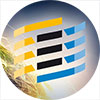The Dutch are far less fashion-conscious than their French or German neighbors, with only 10% stating they follow fashion trends. Practicality, weatherproofing, recycling, and affordability play a much greater role in fashion e-commerce in the Netherlands than mirroring the styles of celebrities or fashion catwalks. Above all: the Dutch prefer a style that is uncomplicated, comfortable, relaxed, pragmatic, and versatile.
That fact may have a lot to do with the unpredictable weather in the Netherlands. Holland has a temperate maritime climate. Winters and summers are mild, and it rains all year round. Basically: you dress for any weather eventuality when you get up in the morning.
Reluctant online shoppers
Nevertheless, the Dutch are well-informed, demanding consumers with great purchasing power. But still: e-commerce in the Netherlands must contend with the fact that the Dutch still prefer shopping offline. They couldn’t be bothered with possible disappointment and lengthy return procedures if the goods received don’t match expectations. They like to browse, touch, and try on, before making a purchase decision.
Unforgiving
Once disappointed by an online shop regarding quality or delivery time, the Dutch are likely to hold a grudge and shun the offending online shop in the future.
Pre-Covid, 80% of fashion sales in the Netherlands were generated by physical shops, according to industry association INretail. Today, online shops offering easy-to-navigate, well-organized, and informative pages plus favorable payment and return policies, quickly climb in the popularity rankings.
Bargains galore
The greatest draw for Dutch online shoppers? Sales, promotions, special offers, and “everything must go” events. According to latest numbers (2022), the annual household income in the Netherlands is on the decline, but still among the top third of EU countries. Bargain bins, two-for-the-price-of-one, and similar offers are therefore practically irresistible to Dutch online shoppers.
Sustainability and the Circular Economy
Dutch designers are pioneers, who combine latest technologies with fashion in very unique ways. Plant-based leather? 3D-printed fabrics? A dress made from old bed linen, trousers made from antique fabrics, and a coat made from upcycled wool? Yes, yes, and yes. Dutch fashion designers have made and continue to make the seemingly impossible a reality.
Unconvinced
But the Dutch population per se is yet to be convinced of the necessity of a circular economy. All these new ideas are costly, and as we said above – the Dutch like to save money. Sure, sustainability, recycling, carbon footprint – these keywords are the focus of many conversations, but not so much when it comes down to cold, hard cash.
Dutch online shoppers see no reason to pay more for sustainability efforts. Isn’t that the responsibility of the retailer? And if things cost more to buy online, well, then they’ll just go to the store themselves.
Getting there
The best progress here is being made with online shops offering second-hand or upcycled fashion. The Netherlands-based ThriftTale is a great example of what Dutch online shoppers look for. And best of all: this online shop also operates two brick-and-mortar locations – one in Utrecht and one in Enschede. Online shoppers might get an idea looking at the online shop offering, and can then visit the location closest to them for the much-preferred physical experience of trying out the item in person.
Bottom line
Transparency, low prices, and high quality, plus a place where the fashion items can be viewed and considered in person. Throw in a pinch of quirky and comfortable, then you have the kind of online shop the Dutch are looking for. Combine all that with variety, and a changing range presented on dynamic pages plus frequent bargains, and you can’t but help to be successful.
Sources
- https://fashionunited.uk/news/background/a-guide-to-the-dutch-fashion-market/2022120766645
- https://www.inretail.nl/english/
- https://www.holland.com/global/tourism/get-inspired/current/fashion/fashion-forward-netherlands
- https://www.ceicdata.com/en/indicator/netherlands/annual-household-income-per-capita
- https://www.holland.com/global/tourism/get-inspired/current/fashion/circular-fashion
- https://thrifttale.com
 Author: Eurotext Editorial Team
Author: Eurotext Editorial Team
We explain how internationalization works, provide tips for your translation projects and outline some of the technology and processes used. We also report on current e-commerce developments and cover a range of language-related topics.

